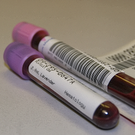Serum Albumin Levels Indicate Severity Of Multiple Myeloma

A study published in Annals of Hematology examined the relationship between serum albumin levels and disease severity in multiple myeloma patients. Results showed that lower levels of serum albumin are associated with greater disease severity.
Serum albumin is the most abundant protein in blood plasma in humans. A patient’s serum albumin level indicates the amount of albumin in grams per deciliter (g/dL) of serum. It is measured by a serum albumin test.
This study retrospectively examined 373 multiple myeloma patients in Seoul, Korea. Patients were split into two groups: those with serum albumin greater than 3.5 g/dL and those with serum albumin less than 3.5 g/dL. Serum albumin levels were compared to other clinical factors used to predict severity of myeloma.
|
MORE INFORMATION News articles about: Forum discussions about: - albumin |
Patients in the lower serum albumin group were, on average, older with a median age of 62 years compared to 58 years for the higher serum albumin group.
The lower serum albumin group had lower levels of hemoglobin, the protein found in red blood cells that helps transport oxygen throughout the body. Low hemoglobin levels means that the bone marrow is overcrowded with myeloma cells and cannot produce the number of red blood cells that the body needs. Symptoms such as fatigue and shortness of breath result from low hemoglobin levels.
The patients with low serum albumin levels had higher levels of serum beta2-microglobulin, M proteins, and bone marrow plasma cells at the time they were diagnosed. These are all indicative of increased disease severity and cancer progression.
Myeloma cells produce monoclonal antibodies or “M” proteins. Higher levels of M proteins are directly related to increased disease progression and severity.
High levels of serum beta2-microglobulins, a protein found on the surface of cells, indicate greater disease progression. Beta2-microglobulin serum levels increase when white blood cells are either created or destroyed. Doctors test the amount of beta2-microglobulin in the blood at the time of a myeloma patient’s diagnosis to determine how much the cancer has multiplied.
This study showed that low serum albumin levels correlated with increased disease severity, but it is unclear as to why this relationship exists. One idea is that serum albumin levels are associated with increased serum concentrations of interleukin-6, a signaling molecule that encourages the growth of myeloma cells. High interleukin-6 levels are already known to exist in multiple myeloma patients.
For more information, please see the study in Annals of Hematology (abstract).
Related Articles:
- None Found
